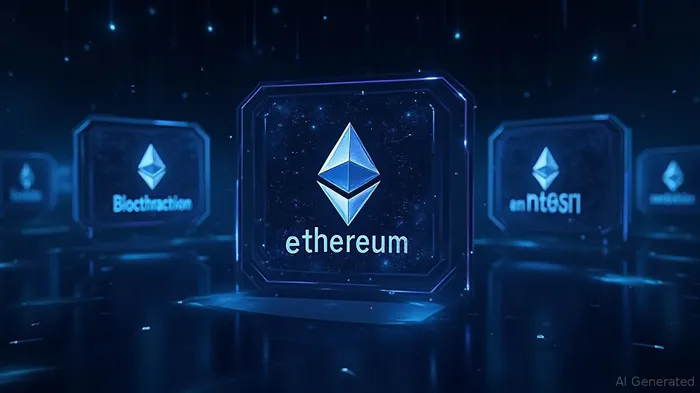Ethereum Leads Despite 31.07% Drop in Developer Activity Across Major Blockchain Networks
Blockchain developer activity has seen a notable decline across major networks, with EthereumETH-- maintaining its position as the leader despite the overall downturn. Ethereum recorded 87.4K development activity events, marking a 31.07% reduction in overall events and a 15.5% decrease in unique contributors, which amounted to 1.4K. This decline, however, did not diminish Ethereum's significant lead over other ecosystems, although this lead has slightly decreased.
Polygon followed as the second-most active network with 40.5K events, experiencing a 29.59% decline. The number of its contributors dropped by 10.59% to 591. Meanwhile, the BNBBNB-- Chain reported 40.2K events, a decrease of 28.3%, and its contributors decreased by 13.1% to 756. These three networks—Ethereum, Polygon, and BNB Chain—all showed a decrease in development momentum, reflecting a broader trend across major blockchain platforms.
Emerging Layer-2 and cross-chain platforms also saw reductions in developer activity. Arbitrum, one of the leading Ethereum Layer-2s, experienced a 33.28% decline to 33.9K events, with contributors reduced by 15.29% to 471. Optimism, another Layer-2, saw a 32% decrease in events (32K) and an 8.87% decrease in contributors (421).
Cosmos, AvalancheAVAX--, and SolanaSOL-- demonstrated similar negative dynamics. CosmosATOM-- recorded 27.7K development events, with contributors dropping by 11.94%. Avalanche had 27.3K occurrences and a 13.29% decrease in contributors. Solana, known for its high-throughput capabilities, experienced a 34.65% decline in development activity and an 8.5% drop in contributors.
Harmony and PolkadotDOT--, ranked ninth and tenth, had the highest drops in developer activity. Harmony’s events decreased by 40.73% to 20.7K, and Polkadot’s by 36.6% to 18.4K. Their contributor numbers dropped by 13.48% and 13.79%, respectively.
Overall, all ten ecosystems saw more than a ten percent decrease in the number of events related to development activity. These decreases range from 22.55% in Cosmos to over 40% in HarmonyHRMY--. The figures for contributors also reduced, but at a slower pace, suggesting that while the number of events dropped significantly, many developers did not quit.
The decline in developer activity across various blockchain networks can be attributed to several factors. One significant issue is the scalability challenges faced by many platforms. Ethereum, for instance, has long struggled with high gas fees and network congestion during peak usage periods. While Layer-2 solutions like Arbitrum and Optimism have provided some relief, the core scalability problem persists. Ethereum's transition to proof-of-stake (PoS) with the Merge was a major environmental win, reducing energy consumption by over 99%, but it did not fully address the scalability issue. Solutions like Proto-Danksharding are in development to tackle data congestion and lower fees, but their full implementation is still a year or two away.
Competitors like Solana have made significant strides in this area, processing millions of transactions daily with near-instant speeds and minimal fees. This has attracted developers seeking smoother performance and faster transaction times. Solana's proof-of-history (PoH) technology allows for thousands of transactions per second, making it a strong contender in the NFT, DeFi, and gaming sectors. Other rising stars, such as Avalanche with its customizable subnet system and Aptos with its developer-friendly tools, are also gaining traction by offering solutions to congestion and high-speed performance.
Internal shakeups within the Ethereum Foundation have also contributed to the decline in developer activity. Critics argue that key updates are being rolled out too slowly, and shifting priorities are causing friction within the community. Decentralization, while a strength of Ethereum, can also lead to slower progress compared to more centralized competitors like Solana, which can push updates faster. This centralized control can sometimes translate into a significant advantage in the fast-moving world of cryptocurrency.
Despite these challenges, Ethereum remains a dominant force in the blockchain ecosystem. Its developer community is massive, with over 6,200 active monthly developers. Ethereum's role as a settlement layer for Layer-2 networks further reinforces its long-term value. While Solana may win in terms of speed, Ethereum's security, stability, and widespread adoption are unmatched. The community's shared values of openness, transparency, and rebelliousness against authority continue to drive its success.
The future of Ethereum hinges on its ability to scale effectively. If the upcoming upgrades, such as Proto-Danksharding, are implemented on schedule, Ethereum could reclaim its edge. However, if delays persist, competitors like Solana may continue to attract projects away from Ethereum. Additionally, macroeconomic factors such as inflation and trade wars are driving more people toward BitcoinBTC-- as a hedge, while stablecoins like USDC and Tether are increasingly used for remittances, DeFi lending, and cross-border payments. These trends highlight the evolving landscape of cryptocurrency, where staying informed and flexible is crucial for navigating the rapid changes.

Quickly understand the history and background of various well-known coins
Latest Articles
Stay ahead of the market.
Get curated U.S. market news, insights and key dates delivered to your inbox.



Comments
No comments yet